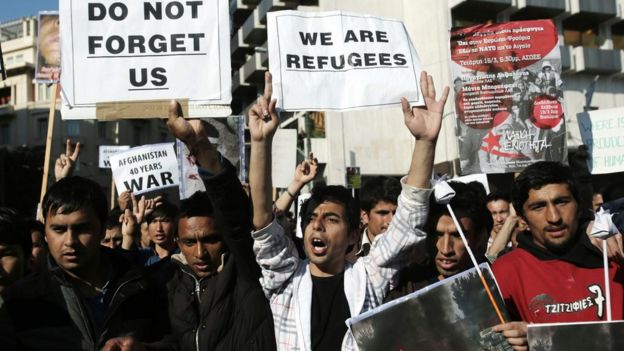The deal between the EU and Turkey to tackle the migrant crisis has come into effect.
Migrants arriving in Greece are now expected to be sent back to Turkey if they do not apply for asylum or their claim is rejected.The influx of people crossing into Greek islands intensified ahead of the deadline.
Meanwhile, thousands of people rallied against the agreement in several European cities.
The deal says that for every Syrian migrant sent back to Turkey, one Syrian already in Turkey will be resettled in the EU.
Some 2,300 experts, including security and migration officials and translators, are set to arrive in Greece to help enforce the deal.
- Unanswered questions
- What does EU deal involve?
- Turkey has EU over a barrel
- Key migrant crisis questions answered
Officials said some 1,500 people crossed the Aegean to Greek islands on Friday, more than double the number the day before and compared with just several hundred a day earlier this week, AFP said.
And, just hours before the truce came into force, a four-month-old baby girl drowned when a boat carrying migrants sank off the Turkish coast, Turkey's Anadolu agency reported.
Since January 2015, one million migrants and refugees have entered the EU by boat from Turkey to Greece. More than 143,000 have arrived this year alone, and about 460 have died, according to the International Organization for Migration.
 AFP
AFP
Key points from the agreement
- Returns: All "irregular migrants" crossing from Turkey into Greece from 20 March will be sent back. Each arrival will be individually assessed by the Greek authorities.
- One-for-one: For each migrant returned to Turkey, a Syrian migrant will be resettled in the EU. Priority will be given to those who have not tried to illegally enter the EU and the number is capped at 72,000.
- Visa restrictions: Turkish nationals should have access to the Schengen passport-free zone by June. This will not apply to non-Schengen countries like Britain.
- Financial aid: The EU is to speed up the allocation of €3bn ($3.3 bn; £2.3 bn) in aid to Turkey to help migrants.
- Turkey EU membership: Both sides agreed to "re-energise" Turkey's bid to join the European bloc, with talks due by July.
Most of them are keen to go to Germany and other northern European Union countries, and tens of thousands are now stuck in Greece as their route north has been blocked.
The agreement is also an attempt to prevent an increase in the influx of people as weather improves.
'Open the borders'
Human rights groups have strongly criticised the deal, with Amnesty International accusing the EU of turning "its back on a global refugee crisis".On Saturday, thousands of people protested in support of refugees and against racism. Rallies were held in London, Athens, Barcelona, Amsterdam, Geneva and some other cities.
In the Greek capital, protesters, including some Afghan refugees, chanted "Open the borders" and "We are human beings, we have rights".
In London, about 4,000 people joined a protest carrying placards with slogans like "Refugees welcome here" and "Stand up to racism"
A note on terminology: The BBC uses the term migrant to refer to all people on the move who have yet to complete the legal process of claiming asylum. This group includes people fleeing war-torn countries such as Syria, who are likely to be granted refugee status, as well as people who are seeking jobs and better lives, who governments are likely to rule are economic migrants.
No comments:
Post a Comment